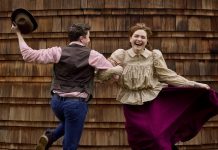In Part 4 of our series of interviews with the director and cast of Kensington Arts Theatre’s Spring Awakening, meet Harrison Smith (Moritz).

Joel: Why did you want to appear in Spring Awakening at Kensington Arts Theatre?
Harrison: When I heard whispers that this show was going to happen right before KAT announced their ‘13-’14 season, I was very interested to be a part of it. I’ve worked with KAT three times prior to this under the direction of Craig Pettinati in Parade and Next to Normal as well as Darnell Morris in Ragtime so I was very familiar with the quality of the work that Kensington regularly produces. On top of all of that, Spring Awakening is just one of those shows that has been sitting on my list to do when the right opportunity presented itself and I couldn’t have seen a more perfect one.
Tell me a little bit about Moritz.
Moritz is at his core a boy beaten down by society. At every turn, he is trying desperately to please everyone and live up to expectations that he perceives are set for him by not only his family but his friends, teachers, and most importantly, perhaps most damagingly by himself.
How do you relate to Moritz?
Moritz and I are similar because I think we both have a tendency to be hard on ourselves when we don’t meet the expectations we set for ourselves. I also think that we share a lot of the same anxieties about how we are perceived by others, fear of failing. I also think Moritz probably would listen to a lot of The Smiths, which I’ve been super into lately.
What has been your greatest challenge in portraying Mortiz? What has helped you overcome these challenges?
My biggest challenge in portraying Moritz was really finding who he is physically. It’s been a particular challenge to play someone so wound up and anxious without defaulting to a tense or restricting physicality. A lot of breaking past this has been making sure that every run has a proper physical warm up before it, which Emily has been great about ensuring we have, as well as just having the chance to play around in the role for a few months.
Are there any life experiences you have faced that have helped you prepare for this role?
Hell, I think these roles are written in such a way that just living as a teenager will prepare you for these roles. Everyone has a bit of a Mortiz inside of them, just as much as everyone has a Melchior, Wendla, etc.
What is it about Steven Sater and Duncan Sheik’s score that most moves you?
There isn’t a doubt that this score is among some of the most beautiful and intense scores of the past decade. Sheik’s instrumentals are so intense and paint these beautiful mosaics of all the emotions of being a teen. Whether it’s the angst of “The Bitch of Living“, the hollow creeping feeling of lust in “Mirror-Blue Night” or the bubblegum pop schoolyard fun of having a crush like in “My Junk,” he’s just created a really stellar image of the modern teenager. As for Sater, his lyrics juxtapose Sheik’s music with these really haunting lyrics with lots of references to Earth and spirits, which is not what I think people expect to hear over the driving rock and pop music Sheik wrote.
Is there any particular moment or number in the show in which you feel you’re most able to express your inner feelings?
There is a moment when Moritz talks to his father after something major happens to him at school and he is (spoiler alert) hit by his father. The moments that I feel Emily, Chris (who plays the Adult Male), and I created in the rehearsal room is so raw and visceral that it immediately sends feelings of all kinds shooting through my body. It’s an incredibly powerful moment in the show.
How have you interpreted Emily Zickler’s vision for the show; how has she helped you to develop and mold your performance?
Emily’s vision for this show is extremely unique. I think anyone who has ever met or worked with Emily on either side of the table (I’ve had the pleasure of acting along side her twice), knows that her vision for anything she does is so incredibly different and is only something she can pull off. Emily has decided to really get to the roots of the original story that Frank Wedekind was trying to tell in 1891. She with the help of our fantastic dramaturg, Jacob Kresloff really got us as actors well versed in the original play from the first week of rehearsals. She also has pulled a lot from her background of Shakespeare to give us direction that allowed us to find the light in the piece as well as these jet black moments of sorrow and despair, often times in the same scene. This take on the show is really unique: there are no microphones, there is not a lot of the traditional angst-y teens jumping over chairs, and this is not a rock concert. Instead, this is a dark and intoxicating piece that implores nothing gimmicky but allows the text to speak for itself.
What have you learned about yourself as an actor throughout this process?
I learned a lot about the art of stillness. I typically have a tendency to be an incredibly energetic performer and while at times that energy really works for the character, Emily has been really intense about pushing me to channel that energy inward and allowing the audiences to see the energy in a different light, as a holy war being waged inside of this boy’s body between what he wants and what society wants for him. This really forced me to head back to the drawing board and back to the script several times throughout the process (as recently as a week ago) to try to find how these moments of intense extroverted energy and introverted energy can intersect. It’s been really interesting in that regard as well as to just be pushed to my limits emotionally by Emily, it has been extremely rewarding.
How do you think audiences can relate to the characters onstage?
Like I said earlier, these characters are written to be relatable. Everyone at one point or another has felt at least for a little while like all of these characters. Whether it’s the deep sadness of Moritz, the questioning and thirst for something more of Melchior, the hot for teacher that Georg has, the wide eyed innocence of Wendla, or the freedom of Ilse, it’s a show that is made to be relatable.
What message do you want audiences to take home with them after seeing Spring Awakening at KAT?
I genuinely hope that audiences leave Spring Awakening ready to talk about it. My biggest hope is that a parent and their teenage son or daughter could come to the show and once they get past the awkward tension of watching some of the stuff on stage could really open up an honest dialogue about all these issues facing teenagers today. Sex is a HARD thing to talk about with your parents and I am sure it is just as hard for parents to talk to their precious babies about it, but this show allows for these topics to be laid out in front of you with a cautionary tale of what can happen when all your urges and desires are told to be repressed and tucked away by society. I also hope that for anyone struggling with depression or anxiety, it urges them to realize they aren’t alone. I love the way Emily has staged “The Song of Purple Summer” because it is truly a reminder that no matter what we aren’t alone.

LINKS
New Whisperings: Meet KAT’s Director and Cast of ‘Spring Awakening’: Part 1: Joanna Frezzo (Ilse).
New Whisperings: Meet KAT’s Director and Cast of ‘Spring Awakening’: Part 2: Catherine Callahan (Martha).
New Whisperings: Meet KAT’s Director and Cast of ‘Spring Awakening’: Part 3: Ryan Alan Jones (Melchior).
New Whisperings: Meet KAT’s Director and Cast of ‘Spring Awakening’: Part 4: Harrison Smith (Moritz).




